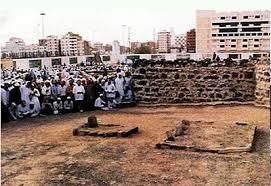Hawzah News Agency- Here's a brief history of Imam Hasan's (as) biography and life events:
Name: Al-Hasan ibn Ali ibn Abi Talib (as(
Mother: Fatimah az-Zahra (as), the daughter of the Holy Prophet (sawa.(
Kunniyat (Patronymic): Abu Muhammad
Laqab (Title): Al-Sibt al-Kabir (the elder grandson), Al-Mujtaba.
Birth: He was born in Madina in the middle of the month of Ramadhan in 3 A.H.
Martyrdom: He died on the 28th of Safar in the year 50 A.H. He was buried in the graveyard of Baqi in Madina.
A Brief History of Imam Hasan’s Life
The Son of the Prophet
Imam Hasan Mujtaba (as) was the second Imam. He and his brother Imam Husayn (as) were the two sons of Amir al-mu"minin Ali and Hadhrat Fatimah, the daughter of the Prophet. Many times the Prophet had said, "Hasan and Husayn are my children". Because of these same words Ali would say to his other children, "You are my children and Hasan and Husayn are the children of the Prophet."
Imam Hasan was born in the year 3 A.H. in Medina and shared in the life of the Prophet for somewhat over seven years, growing up during that time under his loving care.
After the death of the Prophet which was no more than three, or according to some, six months earlier than the death of Hadhrat Fatimah, Hasan was placed directly under the care of his noble father.
The beginning of Imam Hasan's (as) Imamate
The Holy Imam (as) helped his father throughout his life until Imam Ali (as) died when the Holy Imam (as) was 37 years old. At this age he inherited his father and became the guardian of the Ahlul Bayt and the Shia. In his well-known will Imam Ali (as) appointed him as the next Imam.
The martyrdom of Imam Ali (as) on the 21st of Mahe Ramadhan, 40 A.H. marked the beginning of Imam Hasan's (as) Imamate. The Muslims pledged their allegiance to him and finalized the formality of Bay'at (Oath of Allegiance). No sooner had he taken the reins of leadership in his hands than he had to meet the challenge of Muawiya bin Abu Sufyan, the governor of Syria, who began trying to undermine his authority. The Holy Imam (as) decided that Muawiya would have to be ousted by force and he prepared for war. He appointed a representative in Kufa and proceeded to Nukhayla where he had asked the army to gather. After 10 days, only 4,000 men had assembled, so he went back to Kufa and made another call for people to come to arms, sending out Hujr bin Adi to do the same.
Slowly the people answered the call for Jihad. A mixed band of people formed the army. Some were sincere Shia, others were Kharjites who wished to fight Muawiya by any means possible, some were men who loved fighting and desired war booty, some were unsure about the right of the Holy Imam (as) to the Caliphate, while others blindly followed their tribal leaders with no thought for religion.
The Holy Imam (as) gave an address to the army in which he first praised Allah and the Holy Prophet (sawa). He then told the people that he was their sincere advisor and urged them to unite rather than be divided in factions. This message was misunderstood by some, who thought that he planned to hand over authority to Muawiya. There was a riot amongst the people and a group of them attacked the Holy Imam (as) while he was in his tent. The Shia gathered around him and protected him.
Later, during the march towards Syria, a man from the Bani Asad attacked the Holy Imam (as) and struck him on the thigh with an axe. Due to the injury, the Holy Imam (as) was forced to stop at Mada'in, from where he sent Ubaidullah bin Abbas with 12,000 men to stop Muawiya, who had advanced into Iraq.
Muawiya managed to bribe and threaten many of the Holy Imam's (as) followers into abandoning him, including Ubaidullah, who was paid one million dirhams to betray the Holy Imam (as).
The Holy Imam (as) realized that he could not trust the intentions of most of his men and the only people he could rely on were his Shia, who were too few to resist the Syrian soldiers. Meanwhile, Muawiya wrote to him suggesting a truce and peace treaty on the Holy Imam's (as) terms.
Muawiya was still not satisfied with affairs. He knew that the treaty was never meant as a surrender of authority by the Holy Imam (as), because he was Divinely Appointed as the Imam.
It was merely an interim transfer of the administration of the Islamic State, subject to the condition that it would be returned to the Holy Imam (as) after Muawiya's death and then it would be in turn inherited by Imam Husayn (as). However, Muawiya had plans to declare Yazid, his son, as his successor, and he decided to get rid of the Holy Imam (as) first.




Your Comment